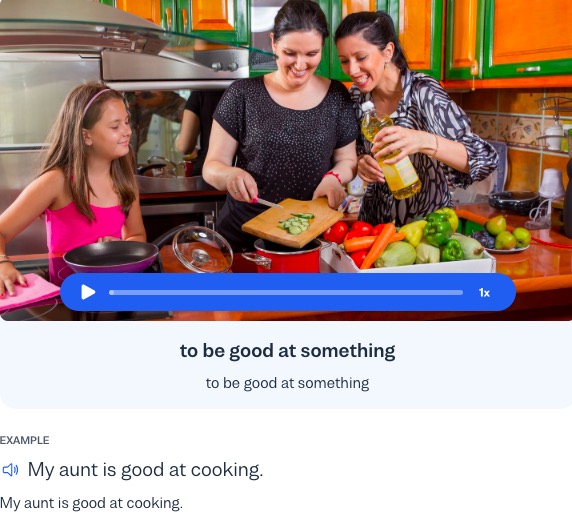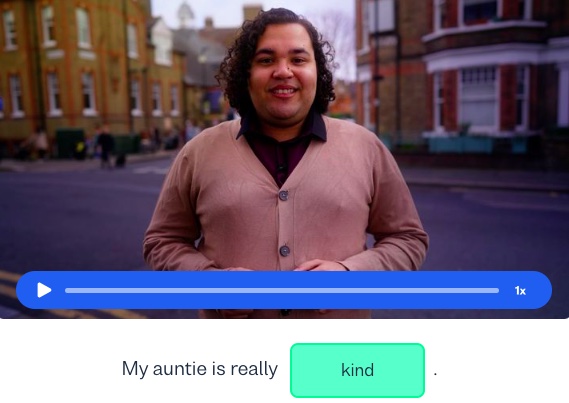How to Use Personality Adjectives
Learn how to navigate the nuances of personality adjectives to improve communication and understanding.
I want to learn...
It will happen, sooner or later, that you will need to describe a person's character and qualities. You’ll want to explain to your new boyfriend why your parents are wonderful or you might want to describe you colleague to your boss with a very diplomatic tone. In these cases you will need a way to describe someone’s personality that goes beyond “good” and “bad”. In this article we will see a few of the most important words describing a person’s attitude towards others, towards life and work. We will also see how to form opposites and also a lot of examples that will help you put this into context. Ready? Let’s begin!
How to remember vocabulary
Learning English, (or any other language) often puts you in a situation where you don’t have all the words you wish you had. You could have the temptation to start memorizing long lists of words, but this is a proven ineffective method.
Instead, it is better to learn a few words by category and break things down further to small and simple classifications. For example, now that you are learning personality adjectives, it is a good idea to remember if these are positive or negative qualities, starting from the simplest ones.
Back to basics: Common words to describe personality
These qualities are in opposition to one another: someone that is not nice is rude, someone that is not funny is boring and so on.
Common positive and negative adjectives
| Positive adjectives | Negative adjectives |
|---|---|
| nice | rude |
| funny | boring |
| friendly | unfriendly |
| responsible | irresponsible |
These are all high frequency words and you probably already heard them, but it never hurts to put these in context.
- Sarah is very nice; she is always offering to help when someone’s in need.
- Sarah is very rude; she never says “hello” or “thank you”.
- Mark is very funny, he has a great sense of humor.
- Mark is so boring, he never has anything interesting to say.
- The new neighbor is really friendly, he came over to introduce himself and brought a little present.
- The new neighbor is really unfriendly, he didn’t say anything when I said hello.
- Jasmin is really responsible at work, she’s always on time and does her best every day.
- Jasmin is so irresponsible! She always spends more money than she has.
Adjectives describing people’s attitude towards others
A big part of your personality consists of how you relate to the rest of the world. Here are a few positive adjectives that describe someone’s attitude.
-
Tolerant: Someone that accepts other people’s opinions.
Usage example:
Even if they had different religions, they remained really tolerant of each other’s traditions. -
Patient: Someone that can confront difficulties.
Usage example:
He’s really patient, it took him two hours to drive here in traffic and he didn’t complain once. -
Generous: Someone that gives and shares freely.
Usage example:
My grandma is so generous! She sends me a care package every few weeks. -
Considerate: Someone that is proactive considering other people’s needs and feelings.
Usage example:
Sharon is really considerate, she always takes the time to offer support to younger colleagues. -
Reliable: Someone that can be trusted.
Usage example:
Lukas is completely reliable. He will take good care of you. -
Respectful: Someone that shows consideration for other people’s opinions and feelings.
Usage example:
Even when you disagree, you have to remain respectful of your classmates. -
Altruistic: Someone that gives high priority to other people’s well being.
Usage example:
Joanne is really altruistic, she volunteers every week at a local shelter.
Here are a few examples of adjectives that describe negative attitudes towards others.
-
Intolerant: The opposite of tolerant, someone that doesn’t accept different opinions.
Usage example:
In the end he got fired because he is intolerant and racist, no one could stand him. -
Selfish: The opposite of altruistic, someone that only thinks for themselves.
Usage example:
He ate all the food that we had prepared for the children. That’s so selfish! -
Dishonest: The opposite of honest, someone that isn’t fair.
Usage example:
They didn’t hire her because she lied on her CV, she was just too dishonest. -
Unreliable: Someone that is not worthy of trust.
Usage example:
He missed another deadline, he’s too unreliable. -
Jealous: Someone that is possessive and cannot be happy when other people are happy.
Usage example:
Oh, you got a new car! I’m jealous!
These are already a few interesting options that can add nuance to your description, but we can push things a little bit further. A big part of personality, in fact, is not just how people would describe you and the attitude you have towards others but how you look at the world in general.
Adjectives that describe people’s attitude towards life
-
Enthusiastic: People that respond to life with happiness and excitement.
Usage example:
There is no problem confronting Andrew with new ideas, he’s always enthusiastic. -
Optimistic: Someone that expects good things to happen.
Usage example:
I’m sure we will all pass the exam, let’s be optimistic. -
Pessimistic: It’s not really a negative quality, but it’s received worse by society. Pessimistic people usually expect bad things to happen.
Usage example:
I can’t talk to Jim right before the exam. He’s too pessimistic and he makes me anxious. -
Adaptable: Someone who can adjust easily to different situations.
Usage example:
Jenna is very adaptable, she never complains. -
Cynical: Someone that doesn’t trust easily.
Usage example:
You always expect the worst from people, you're too cynical. -
Spiritual: Someone that gives great importance to religion or matters of the soul.
Usage example:
She meditates, she does yoga and participates in health retreats. She is very spiritual. -
Pragmatic: Someone that is always looking for a practical solution to a problem.
Usage example:
I will ask my mom for advice on this, she is always very pragmatic. -
Progressive: Someone that asks for positive social change in politics.
Usage example:
My dad is really progressive, he alway marches in favor of civil rights. -
Conservative: Someone that in politics advocates to maintain traditional values and resist abrupt change.
Usage example:
My aunt is really conservative, she would not approve of my lifestyle. -
Brave: Someone that shows courage.
Usage example:
She doesn’t scare in front of difficult moments in life, she’s really brave.
Looking at opposites: How do we form negative and positive adjectives?
You might have noticed that there are a few ways to form opposites describing a quality. Take a look at this table:
Forming positive and negative adjectives
| Positive | Negative |
|---|---|
| honest | dishonest |
| friendly | unfriendly |
| tolerant | intolerant |
| responsible | irresponsible |
| optimistic | pessimistic |
| nice | rude |
As you can see, we have a few different systems to form an opposite. Some opposites are formed by adding a prefix, a syllable that negates the quality, like dis-, un- or in- (which becomes ir- in front of an “r” like in irresponsible). A few words will be different but have the same structure like optimistic and pessimistic and then there are the ones that have two completely separate words altogether.
Understanding these opposites is essential when considering personality traits. A good person can have a bad day, but when discussing personality, we refer to the consistent qualities that shape someone’s character on a regular day.
A good person can have a bad day: What is personality?
When we talk about personality we usually refer to those qualities that we have on a regular day. That doesn’t mean that a funny, kind, considerate person couldn’t be in a bad mood for a day. There are a number of life’s little problems that could drive a good person mad, but this doesn’t mean that it won’t pass. No, when we talk about personality, we are describing those characteristics that will be with someone pretty much every day of their lives.
Examples of personality adjectives vs expressions describing mood
- Usually John is very calm and patient but since he lost his job, he’s been acting more irritable and anxious.
- Ann is not always this angry, you’ve caught her on a bad day.
- Mark is always happy and funny, today he’s in a bad mood.
Losing a job is stressful and this is the reason John is not his usual calm and patient self; Ann is having a bad day and is angry and Mark is in a bad mood, so he is not happy and funny as usual. We can see that there are a few expressions that stress how someone is behaving differently from usual: they act a certain way, they are in a good or bad mood, or we caught them on a bad day.
Wrapping up
We have seen how describing people goes beyond simple words like “good” or “bad”. To give a nuanced description you will have more words that describe not only their character but also their attitude towards others and life. Remember that learning vocabulary will happen through context and that you can also have a lot of fun doing it!
Need to expand your vocabulary?
Start expanding your vocabulary right now with Busuu’s free online courses and learning resources! Dive into reading, engage in fun exercises and learn new words daily.

